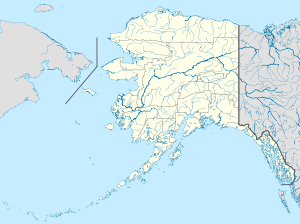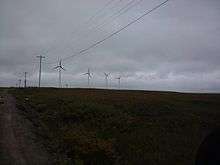Chevak, Alaska
| Chevak Cevʼaq | |
|---|---|
| City | |
|
The school (blue), lake, and condemned old school (red). | |
 Chevak Location in Alaska | |
| Coordinates: 61°31′40″N 165°34′43″W / 61.52778°N 165.57861°WCoordinates: 61°31′40″N 165°34′43″W / 61.52778°N 165.57861°W | |
| Country | United States |
| State | Alaska |
| Census Area | Kusilvak |
| Incorporated | October 13, 1967[1] |
| Government | |
| • Mayor | Richard Tuluk[2] |
| • State senator | Donald Olson (D) |
| • State rep. | Neal Foster (D) |
| Area | |
| • Total | 1.2 sq mi (3 km2) |
| • Land | 1.1 sq mi (3 km2) |
| • Water | 0 sq mi (0.1 km2) |
| Elevation | 49 ft (15 m) |
| Population (2007)[3] | |
| • Total | 828 |
| Time zone | Alaska (AKST) (UTC-9) |
| • Summer (DST) | AKDT (UTC-8) |
| ZIP code | 99563 |
| Area code | 907 |
| FIPS code | 02-13230 |
Chevak (Cevʼaq , which means "cut-through channel" in Chevak Cup’ik) is a city in Kusilvak Census Area, Alaska, United States. At the 2000 census the population was 765.
There is a tri-language system in Chevak; English, Cup’ik, and a mixture of the two languages. The people in Chevak speak a dialect of Central Yup'ik, Cup'ik (pr. Chew-pick), and identify themselves as Cup'ik people rather than Yup'ik. This unique identity has allowed them to form a single-site school district, the Kashunamiut School District, rather than joining a neighboring Yup'ik school district. The Cup'ik dialect is distinguished from Yup'ik by the change of "y" sounds into "ch" sounds, represented by the letter "c", and by some words that are completely different from Yup'ik words.
Geography
Chevak is located at 61°31′40″N 165°34′43″W / 61.52778°N 165.57861°W (61.527673, -165.578702).[4]
According to the United States Census Bureau, the city has a total area of 1.2 square miles (3.1 km2), of which, 1.1 square miles (2.8 km2) of it is land and 0.04 square miles (0.10 km2) of it (1.71%) is water.
Wind power

Chevak is powered by four 30-meter-tall wind turbines. The wind generated in Chevak is classified as "Class 6 – Outstanding", and is owned and operated by AVEC (Alaska Villages Electric Cooperative).[5]
Demographics
| Historical population | |||
|---|---|---|---|
| Census | Pop. | %± | |
| 1940 | 43 | — | |
| 1950 | 230 | 434.9% | |
| 1960 | 315 | 37.0% | |
| 1970 | 387 | 22.9% | |
| 1980 | 466 | 20.4% | |
| 1990 | 598 | 28.3% | |
| 2000 | 765 | 27.9% | |
| 2010 | 938 | 22.6% | |
| Est. 2015 | 1,018 | [6] | 8.5% |
As of the census[8] of 2000, there were 765 people, 167 households, and 129 families residing in the city. The population density was 668.6 people per square mile (259.1/km²). There were 190 housing units at an average density of 166.1 per square mile (64.4/km²). The racial makeup of the city was 3.66% White, 90.46% Native American, 0.13% from other races, and 5.75% from two or more races. 0.65% of the population were Hispanic or Latino of any race.
There were 167 households, out of which 64.1% had children under the age of 18 living with them. 41.3% were married couples living together, 20.4% had a female householder with no husband present, and 22.2% were non-families. 19.2% of all households were made up of individuals and 0.6% had someone living alone who was 65 years of age or older. The average household size was 4.58 and the average family size was 5.38.
In the city, the age distribution of the population shows 51.8% under the age of 18, 8.8% from 18 to 24, 23.9% from 25 to 44, 11.5% from 45 to 64, and 4.1% who were 65 years of age or older. The median age was 17 years. For every 100 females, there were 113.7 males. For every 100 females age 18 and over, there were 113.3 males.
The median income for a household in the city was $26,875, and the median income for a family was $27,375. Males had a median income of $21,875 versus $18,125 for females. The per capita income for the city was $7,550. About 26.7% of families and 29.5% of the population were below the poverty line, including 32.5% of those under age 18 and 13.3% of those age 65 or over.
References
- ↑ "Directory of Borough and City Officials 1974". Alaska Local Government. Juneau: Alaska Department of Community and Regional Affairs. XIII (2): 24. January 1974.
- ↑ 2015 Alaska Municipal Officials Directory. Juneau: Alaska Municipal League. 2015. p. 42.
- ↑ "Annual Estimates of the Population for Incorporated Places in Alaska". United States Census Bureau. 2008-07-10. Archived from the original on 2008-09-12. Retrieved 2008-07-14.
- ↑ "US Gazetteer files: 2010, 2000, and 1990". United States Census Bureau. 2011-02-12. Retrieved 2011-04-23.
- ↑ "Wind Resource Assessment" (PDF). Alaska Industrial Development and Export Authority. 2006-05-08. Retrieved 2010-09-13.
- ↑ "Annual Estimates of the Resident Population for Incorporated Places: April 1, 2010 to July 1, 2015". Retrieved July 2, 2016.
- ↑ "Census of Population and Housing". Census.gov. Archived from the original on May 11, 2015. Retrieved June 4, 2015.
- ↑ "American FactFinder". United States Census Bureau. Archived from the original on 2013-09-11. Retrieved 2008-01-31.

